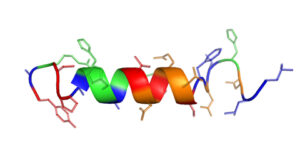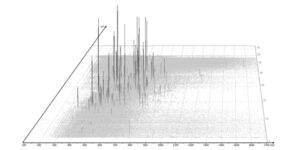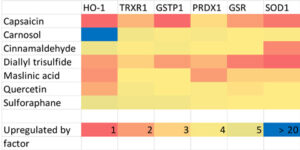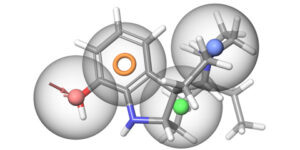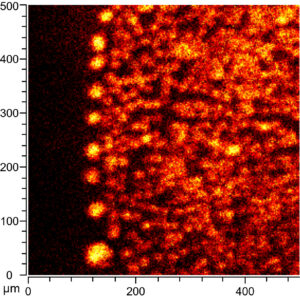Research
The food chemistry research group at FAU focuses on the molecular determinants of food bioactivity and functionality. Foods are complex systems, which are composed of thousands of different components. In order to understand how the foods’ molecular composition modulates their (bio-)function, comprehensive profiling methods are applied based on cutting-edge mass spectrometry methods and bioinformatic tools.
Food peptides strongly influence the quality and possible health benefits of food. The combination of different high-resolution mass spectrometry methods allows for comprehensive qualitative and quantitative peptide profiling. Linked to virtual screening and bioinformatics analysis, the peptide profiles lead to the identification of novel functional ingredients, such as, e.g., highly active antimicrobial peptides from milk and plant sources.
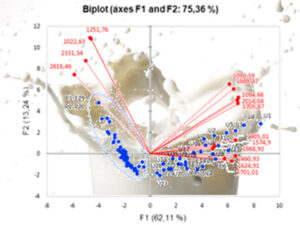 Peptide profiling in combination with bioinformatics analysis can also identify marker compounds to control the authenticity of food, for example of milk and milk products, or to detect food fraud. Since various external and internal parameters influence the milk peptidome, a peptide marker set reflects various food properties, such as species, fermentation, storage or processing conditions.
Peptide profiling in combination with bioinformatics analysis can also identify marker compounds to control the authenticity of food, for example of milk and milk products, or to detect food fraud. Since various external and internal parameters influence the milk peptidome, a peptide marker set reflects various food properties, such as species, fermentation, storage or processing conditions.
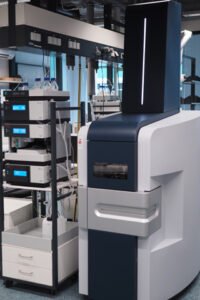 High-resolution mass spectrometry linked to bioinformatics tools allows comprehensive profiling of the protein composition in foods. Thus, the qualitative protein composition reveals bioactive, techno-functional proteins and detects molecular differences between samples. Quantitative proteome analysis is a highly flexible method for the absolute and relative quantification of protein profiles in a complex food. Qualitative and quantitative protein profiles decipher the molecular determinants of food quality, health benefits and safety with the goal to control and rationally design its properties.
High-resolution mass spectrometry linked to bioinformatics tools allows comprehensive profiling of the protein composition in foods. Thus, the qualitative protein composition reveals bioactive, techno-functional proteins and detects molecular differences between samples. Quantitative proteome analysis is a highly flexible method for the absolute and relative quantification of protein profiles in a complex food. Qualitative and quantitative protein profiles decipher the molecular determinants of food quality, health benefits and safety with the goal to control and rationally design its properties.
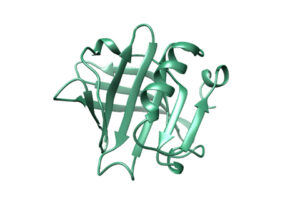 On the protein level, food proteomics aims for the comprehensive analysis of individual protein structures. Our work group develops and applies mass spectrometry methods for the systematic survey of non-enzymatic posttranslational modifications including structure elucidation and the time-dependent quantification of each specific product and binding site. The most prevalent non-enzymatic posttranslational modifications are oxidation, glycation to advanced glycation end-products (AGE), and Maillard reactions, which are formed, for example, during food processing.
On the protein level, food proteomics aims for the comprehensive analysis of individual protein structures. Our work group develops and applies mass spectrometry methods for the systematic survey of non-enzymatic posttranslational modifications including structure elucidation and the time-dependent quantification of each specific product and binding site. The most prevalent non-enzymatic posttranslational modifications are oxidation, glycation to advanced glycation end-products (AGE), and Maillard reactions, which are formed, for example, during food processing.
Bioactive molecules interact with various cellular targets. Cellular proteomics aims for the comprehensive description of cellular reactions towards bioactive molecules by their time-dependent protein expression profile. The profile eventually allows the precise prediction of the tested bioactive components. Our work group developed, for example, pluridimensional targeted proteome assays to evaluate cytoprotective food components.
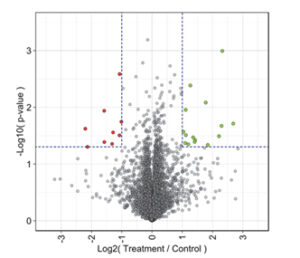 Within the DFG Research Training Group “Medicinal Chemistry of Selective GPCR Ligands” (RTG1910), we developed multiplexed targeted proteome assays to monitor downstream signaling events resulting from functionally selective ligand binding. Untargeted profiling of protein expression can identify novel signaling events. The objective was therefore to develop a fast and flexible assay system based on proteomics tools to address ligand-biased signaling of ligands of G protein-coupled receptors.
Within the DFG Research Training Group “Medicinal Chemistry of Selective GPCR Ligands” (RTG1910), we developed multiplexed targeted proteome assays to monitor downstream signaling events resulting from functionally selective ligand binding. Untargeted profiling of protein expression can identify novel signaling events. The objective was therefore to develop a fast and flexible assay system based on proteomics tools to address ligand-biased signaling of ligands of G protein-coupled receptors.
As a part of the International Graduate Programme “Receptor Dynamics: Emerging Paradigms for Novel Drugs” of Elite Network of Bavaria, our group addressed the ligand-specific conformation of G protein-coupled receptors by a quantitative mass spectrometry approach.
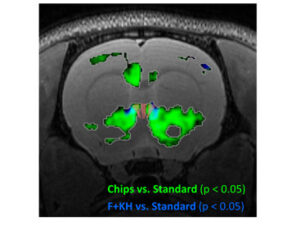 “Neurotrition” describes the interaction between nutrition and neuronal function. Nutrients and diet can modulate brain functionality and brain activity, while the brain’s activity patterns in turn influence the nutritional intake.
“Neurotrition” describes the interaction between nutrition and neuronal function. Nutrients and diet can modulate brain functionality and brain activity, while the brain’s activity patterns in turn influence the nutritional intake.
The ongoing projects aim to elucidate how molecularly defined food components affect the brain functionality, and how the neurophysiological processes influence the type and quantity of consumed food.
The research unit Food Safety and Quality is a scientific platform for interdisciplinary research projects focusing on the quality enhancement of food and the improvement of food safety. For this purpose, different disciplines at Friedrich-Alexander-Universität Erlangen-Nürnberg pool cutting-edge research in food-related projects. Translational projects transfer the results at an early stage to technical applications. The research is funded by the Rudolf und Henriette Schmidt-Burkhardt Stiftung.
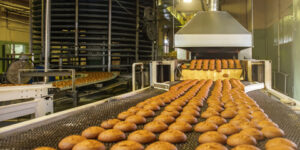 Starting December 2024, the projects of the research unit will be supported by Hannah Zenker, Junior group leader of the Food Safety and Quality group.
Starting December 2024, the projects of the research unit will be supported by Hannah Zenker, Junior group leader of the Food Safety and Quality group.
2025
- Dolles, Simon, et al. "Versatile Features of an Antibody Mimetic Peptide and Its Variants." Journal of Peptide Science 31.3 (2025).
- Gensberger-Reigl, Sabrina. "The Flipped Lab: Combining the Flipped Classroom Model with an Electronic Lab Notebook for Enhanced Digitalization and Preparation in Laboratory Courses." Journal of Chemical Education 102.1 (2025): 248-252.
- Gensberger-Reigl, Sabrina, and Hannah Zenker. "Detection of intact bovine milk proteins after simulated gastrointestinal infant digestion using UHPLC − HRMS." Food Chemistry 465 (2025).
- Hotz, Lisa, et al. "Enzymatically Formed Fatty Acid Hydroperoxides Determined Through GC-MS Analysis of Enantiomeric Excess of Hydroxy Fatty Acids After Reduction and Ibuprofen Derivatization." European Journal of Lipid Science and Technology (2025).
- Liang, Yifan, et al. "Formation of non-enzymatic protein modifications (nePTMs) on caseins and whey proteins during dry heating and the impact on their in vitro infant digestion profile." Food Chemistry 493 (2025).
2024
- Atalar, Ilyas, et al. "Drying and characterization of red beet color liquid process waste to develop a novel bulking agent." Journal of Cleaner Production 442 (2024).
- Handke, Maria, et al. "New fluorogenic triacylglycerols as sensors for dynamic measurement of lipid oxidation." Analytical and Bioanalytical Chemistry (2024).
- Hieronimus, Bettina, Simon Hammann, and Maren C. Podszun. "Can the AI tools ChatGPT and Bard generate energy, macro- and micro-nutrient sufficient meal plans for different dietary patterns?" Nutrition Research 128 (2024): 105-114.
- Janzen, George, et al. "Testing sample selection criteria and loss of biomarkers during cleaning of archaeological unglazed pottery to maximize organic residue quantities." Archaeometry (2024).
- Klemt, Insa, et al. "A concept of dual-responsive prodrugs based on oligomerization-controlled reactivity of ester groups: an improvement of cancer cells versus neutrophils selectivity of camptothecin." RSC Medicinal Chemistry (2024).
- Liu, Jiajia, et al. "Regioselective analysis of heat-induced conformational changes of β-lactoglobulin by quantitative liquid chromatography–mass spectrometry analysis of chemical labeling kinetics." Food Chemistry 460 (2024).
- Magouz, Osama, et al. "Identification of the Heptapeptide PR7 and Octapeptide SF8 With Potent Antioxidative and Angiotensin Converting Enzyme Inhibitory Activity From the Fermented Dairy By-Product “Buttermilk”." Food Frontiers (2024).
- Mauser, Andreas, et al. "Influence of Software Settings on the Identification Rate, Quantification Results, and Reproducibility in Profiling Post-Translational Modifications by Microflow Liquid Chromatography-Ion Mobility-Quadrupole Time-Of-Flight Analysis Using PEAKS Software." Journal of Proteome Research (2024).
- Ohno, Reiichi, et al. "Qualitative and Quantitative Profiling of Fructose Degradation Products Revealed the Formation of Thirteen Reactive Carbonyl Compounds and Higher Reactivity Compared to Glucose." Journal of Agricultural and Food Chemistry (2024).
- Vykukal, Rachel, et al. "‘Old food, new methods’: recent developments in lipid analysis for ancient foodstuffs." Trac-Trends in Analytical Chemistry 176 (2024).
- Zenk, Nora, et al. "Comprehensive species- and processing-specific peptide profiling of pasteurized, extended shelf-life and ultra-high temperature milk from cow, goat, sheep, buffalo, and mare." Food Chemistry 438 (2024).
2023
- Börsig, Amelie, Nevzat Konar, and Sevim Dalabasmaz. "A model study on the site-specificity of (−)-epicatechin-induced reactions in β-lactoglobulin by high-resolution mass spectrometry in combination with bioinformatics." Food Chemistry 408 (2023).
- Dalabasmaz, Sevim, Mehmet Erhan Melayim, and Nevzat Konar. "Effects of gelatin concentration, adding temperature and mixing rate on texture and quality characteristics of model gels." Journal of Texture Studies (2023).
- Dalabasmaz, Sevim, et al. "Cocoa polyphenols and milk proteins: covalent and non-covalent interactions, chocolate process and effects on potential polyphenol bioaccesibility." Critical Reviews in Food Science and Nutrition (2023).
- Dalabasmaz, Sevim, et al. "Identification of Potential Bioactive Peptides in Sheep Milk Kefir through Peptidomic Analysis at Different Fermentation Times." Foods 12.15 (2023).
- Danyeli, Lena Vera, et al. "Association of the delayed changes in glutamate levels and functional connectivity with the immediate network effects of S-ketamine." Translational Psychiatry 13.1 (2023).
- Danyeli, Lena Vera, et al. "Correction: Association of the delayed changes in glutamate levels and functional connectivity with the immediate network effects of S-ketamine (Translational Psychiatry, (2023), 13, 1, (60), 10.1038/s41398-023-02346-0)." Translational Psychiatry 13.1 (2023).
- Hammann, Simon. "Wo sind die Lebensmittelchemiker:innen geblieben?" Deutsche Lebensmittel-Rundschau 2023-September (2023).
- Hoferer, Laura, et al. "Identification and Quantification of Resveratrol and Its Derivatives in Franconian Wines by Comprehensive Liquid Chromatography-Tandem Mass Spectrometry." ACS Food Science & Technology (2023).
- Huber, B., et al. "Biomolecular characterization of 3500-year-old ancient Egyptian mummification balms from the Valley of the Kings." Scientific Reports 13.1 (2023).
- Konar, Nevzat, et al. "Effects of various milk powders on main quality parameters of cocoa butter substitute-based chocolate." International Dairy Journal 139 (2023): 105571.
- Li, Yan, et al. "Identification of colupulone and lupulone as the main contributors to the antibacterial activity of hop extracts using activity-guided fractionation and metabolome analysis." Food Research International 169 (2023).
- Li, Yan, et al. "The beer component hordenine inhibits alcohol addiction-associated behaviours in mice." Addiction Biology 28.8 (2023).
- Magouz, Osama, et al. "Profiles, antioxidative and ACE inhibitory activity of peptides released from fermented buttermilk before and after simulated gastrointestinal digestion." Innovative Food Science & Emerging Technologies 84 (2023): 103266.
- Pischetsrieder, Monika, and Dagmar Fischer. "FAU Forschungszentrum Neue Wirkstoffe (FAU NeW) nimmt Arbeit auf - interdisziplinäre Zusammenarbeit zur Entwicklung neuer Wirkstoffe." Deutsche Lebensmittel-Rundschau 119.5 (2023): 213-.
- Saller, Julia, et al. "Identification and quantification of kukoamine A and kukoamine B as novel μ-opioid receptor agonists in potato and other solanaceous plants." Food Chemistry 427 (2023).
- Schneider, Svenja, Simon Hammann, and Heiko Hayen. "Determination of Polar Lipids in Wheat and Oat by a Complementary Approach of Hydrophilic Interaction Liquid Chromatography and Reversed-Phase High-Performance Liquid Chromatography Hyphenated with High-Resolution Mass Spectrometry." Journal of Agricultural and Food Chemistry 71 (2023): 11263-11275.
- Tamtürk, Faruk, et al. "Optimization of Chlorella vulgaris spray drying using various innovative wall materials." Algal Research 72 (2023).
- Tietel, Zipora, et al. "An overview of food lipids toward food lipidomics." Comprehensive Reviews in Food Science and Food Safety (2023).
- Weigel, Ingrid, et al. "Dried Vegetables as Potential Clean-Label Phosphate Substitutes in Cooked Sausage Meat." Foods 12.10 (2023).
- Wenk, Deborah, et al. "Phosphoproteomic Analysis of Dopamine D2 Receptor Signaling Reveals Interplay of G Protein- and β-Arrestin-Mediated Effects." Journal of Proteome Research 22.1 (2023): 259-271.
- Wieck, Christine, et al. "Neue Sorgfaltspflichten für Unternehmen des Agrarund Ernährungssektors: Empfehlungen zu aktuellen Gesetzesentwicklungen." Berichte Uber Landwirtschaft 101.3 (2023).
- Zartmann, Anne, Leon Völcker, and Simon Hammann. "Quantitative analysis of fatty acids and vitamin E and total lipid profiling of dietary supplements from the German market." European Food Research and Technology (2023).
2022
- Auditore, Andrea, Sabrina Gensberger-Reigl, and Monika Pischetsrieder. "In Vitro Reactivity of the Glucose Degradation Product 3,4-Dideoxyglucosone-3-ene (3,4-DGE) towards Abundant Components of the Human Blood Circulatory System." International Journal of Molecular Sciences 23.9 (2022).
- Damm, Dominik, et al. "Covalent coupling of HIV-1 glycoprotein trimers to biodegradable calcium phosphate nanoparticles via genetically encoded aldehyde-tags." Acta Biomaterialia (2022).
- Gensberger-Reigl, Sabrina, Vera Lúcia Rodrigues Guimarães Abreu, and Monika Pischetsrieder. "Analysis of Chlorate in Chemical Leavening Agents Used for Bakery Products by Liquid Chromatography-Mass Spectrometry." Journal of Agricultural and Food Chemistry (2022).
- Gensberger-Reigl, Sabrina, et al. "Degradation and de novo formation of nine major glucose degradation products during storage of peritoneal dialysis fluids." Scientific Reports 12.1 (2022).
- Hammann, Simon, et al. "Neolithic culinary traditions revealed by cereal, milk and meat lipids in pottery from Scottish crannogs." Nature Communications 13.1 (2022).
- Noriega, Daniela Briceno, et al. "Receptor Mediated Effects of Advanced Glycation End Products (AGEs) on Innate and Adaptative Immunity: Relevance for Food Allergy." Nutrients 14.2 (2022).
- Sabraoui, Talal, et al. "Alleviate Effect of Pomegranate Peel Extract in Ameliorating Fluoride-Induced Cytotoxicity, Oxidative Stress in Tetrahymena pyriformis Model." Biointerface Research in Applied Chemistry 12.3 (2022): 3710-3724.
- Wehrmaker, Ariane M., et al. "Amino Acid Modifications During the Production (Shearing, Sterilization) of Plant-Based Meat Analogues: An Explorative Study Using Pet Food Production as an Example." ACS Food Science & Technology (2022).


